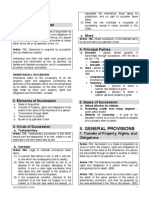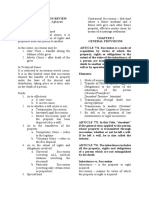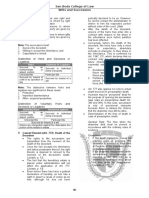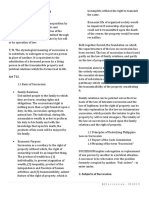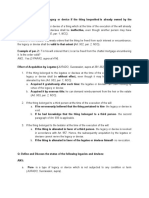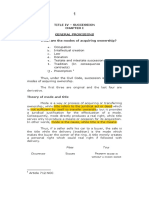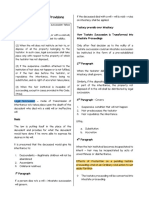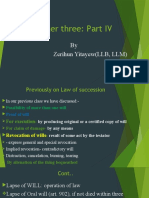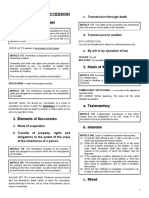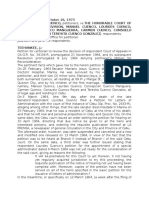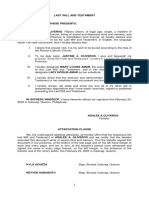Wills Reviewer 6
Wills Reviewer 6
Uploaded by
Christine BernalCopyright:
Available Formats
Wills Reviewer 6
Wills Reviewer 6
Uploaded by
Christine BernalOriginal Description:
Original Title
Copyright
Available Formats
Share this document
Did you find this document useful?
Is this content inappropriate?
Copyright:
Available Formats
Wills Reviewer 6
Wills Reviewer 6
Uploaded by
Christine BernalCopyright:
Available Formats
lOMoARcPSD|22942085
Wills Reviewer 6
Law On Obligations And Contracts (University of Baguio)
Studocu is not sponsored or endorsed by any college or university
Downloaded by Christine Bernal (christinecoro1107@gmail.com)
lOMoARcPSD|22942085
Wills and Succession Reviewer
PROVISIONS COMMON TO TESTATE and INTESTATE
SUCCESSION Art. 1023. Accretion shall also take place among devisees,
legatees and usufructuaries under the same conditions
ACCRETION: It is a right by virtue of which, when two or more established for heirs.
persons are called to the same inheritance, devise or legacy,
the part assigned to one who renounces or cannot receive his
share or who died before the testator is added or incorporated EXCLUDE THE RIGHT OF ACCRETION:
to that of his co-heirs, co-devisees, or co-legatees. Art. 1017. The words "one-half for each" or "in equal shares"
or any others which, though designating an aliquot part, do
Basis: The right of accretion is based upon the presumed will of not identify it by such description as shall make each heir
the decedent. Thus, the testator can expressly provide that the exclusive owner of determinate property, shall not
there shall be no accretion among persons who would exclude the right of accretion.
otherwise be entitled thereto. Conversely, the testator may
validly provide for accretion in a case where no accretion In case of money or fungible goods, if the share of each heir
would take place under the provisions of the law. [Tolentino] is not earmarked, there shall be a right of accretion.
Art. 1015. The representative is called to the succession by IN CASE OF VACANT PORTION:
the law and not by the person represented. The
representative does not succeed the person represented Art. 1022. In testamentary succession, when the right of
but the one whom the person represented would have accretion does not take place, the vacant portion of the
succeeded. instituted heirs, if no substitute has been designated, shall
pass to the legal heirs of the testator, who shall receive it
Art. 971. The right of representation applies only in the with the same charges and obligations.
descending line and never in the ascending line;
In the collateral line, it takes place only in favor of the PRIORITY OF DISTRIBUTION:
children of brothers or sisters, whether they be of the full or 1. Compulsory heir -legitime
half blood. 2. Share of instituted heir - institution
3. Substitution (predecease, incapacity)
4. Representation
REQUISITES FOR ACCRETION: 5. Accretion
1. Unity of object - only in instances where our compulsory heirs are
2. Plurality of subject - two or more persons are called instituted or for voluntary heirs, devises and
to the same inheritance or same portion legacies
3. Vacant portion - one of persons thus called die - compulsory heirs always inherit in their own right
before the testator, or renounce the inheritance, or be 6. Intestate succession
incapacitated to receive it - accretion may be applied in intestate succession
- Happens when: only in cases of REPUDIATION [Art. 1018, CC]
a. repudiation
b. predecease INTESTATE: When does accretion apply?
c. incapacity
d. non-fulfillment of suspensive condition Scenario REASON FOR WHOM
e. particular heir cannot be identified
1 Person repudiates accrue to his co-heirs
Art. 1016. In order that the right of accretion may take place [1018] his inheritance
in a testamentary succession, it shall be necessary:
(1) That two or more persons be called to the same 2 Relative his portion shall accrue to
inheritance, or to the same portion thereof, pro [968] repudiates/ other relatives of the same
indiviso; and incapacitated to degree
(2) That one of the persons thus called die before the succeed (save the right of
testator, or renounce the inheritance, or be representation when it should
incapacitated to receive it. take place)
Art. 1021. Among the compulsory heirs the right of RULES OF ACCRETION:
accretion shall take place only when the free portion is left 1. The heirs to whom the portion goes by the right of
to two or more of them, or to any one of them and to a accretion take it in the same proportion that they
stranger. inherit. [Art. 1019, CC]
2. The heirs to whom the inheritance accrues shall
Should the part repudiated be the legitime, the other co- succeed to all the rights and obligations which the
heirs shall succeed to it in their own right, and not by the heir who renounced or could not receive it would
right of accretion. have had. [Art. 1020, CC]
1
Downloaded by Christine Bernal (christinecoro1107@gmail.com)
lOMoARcPSD|22942085
Wills and Succession Reviewer
CAPACITY TO SUCCEED BY WILL OR INTESTACY c. A guardian with respect to testamentary dispositions
It is not only on the part of the testator who must be given by a ward in his favor before approval of
capacitated at the time of the execution of the will, the heir guardian’s final accounts
must also be capacitated to succeed. XPN: when the guardian is the compulsory heir of
the ward, in which case the disposition is
REQUISITES FOR CAPACITY: VALID
1. The heir, legatee or devisee must be living or in XPN: Relatives of the guardian
existence at the moment the succession opens;
[Art. 1025, CC] and d. Any attesting witness to the decedent’s will, and
2. He must not be incapacitated or disqualified by law his/her spouse, children, and parents
to succeed. [Art 1024, par.1] XPN: brother, sister, grandchildren, and other
descendants of the attesting witness
LAW GOVERNING CAPACITY TO SUCCEED:
What if we have more than 3 attesting witnesses
Art. 1039. Capacity to succeed is governed by the law of the and one of them is a compulsory heir?
nation of the decedent. - You can still give the share of that attesting
witness by disqualifying him from being an
JURIDICAL PERSONS TO SUCCEED: attesting witness. Will remains legal as the
requirement of 3 attesting witnesses is still
Art. 1026. A testamentary disposition may be made to the fulfilled
State, provinces, municipal corporations, private - But if there are only 3 attesting witness, we
corporations, organizations, or associations for religious, cannot disqualify him, however he cannot
scientific, cultural, educational, or charitable purposes. receive his share
- Notary public also cannot be an attesting
All other corporations or entities may succeed under a will, witness
unless there is a provision to the contrary in their charter or
the laws of their creation, and always subject to the same. e. Any physician, surgeon, nurse, health officer or
druggist who took care of the testator during his last
PERSONS INCAPABLE OF SUCCEEDING: illness
1. Absolute: you cannot inherit from anybody - Care should be continuing or regular, not
a. Individuals, associations, or corporations not isolated service
permitted by law or their charter to inherit; XPN: Relatives of the health workers
b. Child not conceived or abortive infant
- One of the requirements for an heir is to be f. Individuals, associations, and corporations not
conceived to have capacity to receive. permitted by law to inherit
- Reckoning point: opening of the succession/
by the time of death of decedent Based on morality or public policy [Arts. 739 and 1028, CC]
2. Relative: 1. Spouse who committed adultery or concubinage
a. Possible undue influence or interest [Art. 1027] - there need no criminal conviction
b. Because of public policy or morality [Art. 1028] - as long as you can prove
c. Unworthiness [Art. 1032] 2. Concubine
3. Those made between person who committed same
Based on undue influence or interest [Art. 1027] criminal offense, in consideration thereof
a. The priest who heard the last confession of the
testator during his last illness, or the minister of the Based on acts of unworthiness [Art. 1032, CC]
gospel who extended spiritual aid to him during the 1. Parents who have abandoned their children or
same period; induced their daughters to lead a corrupt or immoral
- referring only to the free portion and not the life, or attempted against their virtue;
legitime of the heir - no conviction needed
XPN: if the priest is a compulsory heir of the 2. Any person who has been convicted of an attempt
decedent, we cannot take away their against the life of the testator, his or her spouse,
legitime. Only his share from free portion descendants, or ascendants;
will be taken in case of undue influence - conviction is necessary, even after the death
of testator
b. The relatives of such priest or minister of the gospel - conviction retroacts to the date of death;
within the fourth degree, the church, order, chapter, pardon by the President will not erase
community, organization, or institution to which such incapacity
priest or minister may belong 3. Any person who has accused the testator of a crime
for which the law prescribes imprisonment for six
Downloaded by Christine Bernal (christinecoro1107@gmail.com)
lOMoARcPSD|22942085
Wills and Succession Reviewer
years or more, if the accusation has been found
groundless;
- acquittal of testator must be definite
- if based on reasonable doubt but there is SPECIAL DISPOSITIONS:
ground for the accusation, then incapacity
Disposed to Effect
does not arise
4. Any heir of full age who, having knowledge of the
[1029] Whole or part of his The executor, with the
violent death of the testator, should fail to report it to
property for prayers court's approval shall
an officer of the law within a month, unless the
and pious works for deliver 1/2 of the estate or
authorities have already taken action; this prohibition
the benefit of his its proceeds to the church
shall not apply to cases wherein, according to law,
soul, in general or denomination to which
there is no obligation to make an accusation;
terms and without the testator may belong,
- if you are actually a witness
specifying its to be used for such
5. Any person convicted of adultery or concubinage
application prayers and pious works,
with the spouse of the testator;
and the other half to the
- this does not include the spouse him/herself
State, for the purposes
6. Any person who by fraud, violence, intimidation, or
mentioned in Article 1013.
undue influence should cause the testator to make a
will or to change one already made;
[1030] In favor of the poor Deemed limited to the
7. Any person who by the same means prevents another
in general, without poor living in the domicile
from making a will, or from revoking one already
designation of of the testator at the time
made, or who supplants, conceals, or alters the
particular persons of his death, unless it
latter's will;
or of any community should clearly appear that
8. Any person who falsifies or forges a supposed will of [shall apply when the his intention was
the decedent. testator has disposed otherwise.
of his property in favor
Cause of Unworthiness: of the poor of a
definite locality]
Art. 1033. The cause of unworthiness shall be without effect
if the testator had knowledge thereof at the time he made [1030] In favor of the poor, Distribution of the
the will, or if, having known of them subsequently, he should with designation of property shall be made by:
condone them in writing. the persons a. person appointed by
considered poor the testator for the
CRITERION FOR QUALIFICATION TO INHERIT: purpose
b. Executor, in default
Art. 1034. In order to judge the capacity of the heir, devisee of [a]
or legatee, his qualification at the time of the death of the c. Justice of the peace,
decedent shall be the criterion. mayor, and municipal
treasurer, should
In cases falling under Nos. 2, 3, or 5 of Article 1032, it shall there be o executor
be necessary to wait until final judgment is rendered, and in who shall decide by a
the case falling under No. 4, the expiration of the month majority of votes all
allowed for the report. questions that may arise.
In all these cases, the
If the institution, devise or legacy should be conditional, the approval of the RTC shall
time of the compliance with the condition shall also be be necessary.
considered.
[1031] In favor of a VOID
What if the disqualified person is a compulsory heir? disqualified person,
even though made
Art. 1035. If the person excluded from the inheritance under the guise of
by reason of incapacity should be a child or an onerous contract,
descendant of the decedent and should have children or made through an
or descendants, the latter shall acquire his right to the intermediary
legitime.
The person so excluded shall not enjoy the usufruct
and administration of the property thus inherited by
his children.
Downloaded by Christine Bernal (christinecoro1107@gmail.com)
lOMoARcPSD|22942085
Wills and Succession Reviewer
EFFECT OF INCAPACITY OF AN EXCLUDED HEIR: FORMS OF ACCEPTANCE: [Arts. 1049 – 1050, CC]
1. His/her alienations of hereditary property and acts (1) Express Acceptance: one made in a public or private
of administration, before the judicial order of document. [Art. 1049 par. 1]
exclusion, are VALID as to third persons who acted in (2) Tacit Acceptance: one resulting from acts by which
good faith [Art. 1036, CC] the intention to accept is necessarily implied or from
2. Has the right to demand indemnity for any acts which one would have no right to do except in
expenses incurred in the preservation of the the capacity of an heir.
hereditary property, and to enforce credits as he (3) Implied Acceptance: Within thirty days after the
may have against the estate [Art. 1037, CC] court has issued an order for the distribution of the
3. Shall be obliged to return the hereditary property estate in accordance with the Rules of Court, the
together with its accessions [Art. 1038, CC] heirs, devisees and legatees shall signify to the court
- Shall be liable for all the fruits and rents he having jurisdiction whether they accept or repudiate
may have received, or could have received the inheritance; if they do not do so within that time,
through the exercise of due diligence they are deemed to have accepted the inheritance.
[Art 1057, CC]
ACTION FOR A DECLARATION OF INCAPACITY &
RECOVERY OF THE INHERITANCE [Art. 1040, CC] An inheritance is deemed accepted:
- Shall be brought within 5 years from the time the (a) If the heir sells, donates, or assigns his right to a
disqualified person took possession thereof. stranger, or to his coheirs, or to any of them – the heir
- It may be brought by any one who may have an must first accept the inheritance before he can
interest in the succession dispose of it.
(b) If the heir renounces the same, even though
gratuitously, for the benefit of one or more of his co-
ACCEPTANCE AND REPUDIATION OF INHERITANCE heirs – this is actually a donation. The heir must first
accept the inheritance before he can donate it.
ACCEPTANCE: The act by which the person called to succeed (c) If the heir renounces it for a price in favor of all his
by universal title either by the testator or by law manifests his co-heirs indiscriminately – this is actually an onerous
will of making his own the universality of the rights and disposition. The heir must first accept the inheritance
obligations which are transmitted to him. [Tolentino] before he can dispose of it.
(d) If the heir should die without having accepted or
REPUDIATION: The manifestation by an heir of his desire not repudiated the inheritance, his rights shall be
to succeed to the rights and obligations transmitted to him. transmitted to his heirs. [Art. 1053, CC]
[Tolentino]
NOTE: Must be accepted within the 30 days by the heirs, if
CHARACTERISTICS: [Arts. 1041–1042, 1056, CC] not accepted or repudiated within the period, it is considered
(1) Acceptance and repudiation must be voluntary and impliedly accepted.
free [Art. 1041, CC]
(2) They are irrevocable except if there is vitiation of NOTE: But if the renunciation should be gratuitous, and in
consent or an unknown will appears [Art. 1056, CC] favor of all the co-heirs (to whom the portion renounced
(3) They have a retroactive effect [Art. 1042, CC] should devolve by accretion), the inheritance shall not be
deemed as accepted. [Art. 1050] This is a true case of
REQUISITES: [Art. 1043, CC] renunciation.
(a) Certainty of death of the decedent
(b) Certainty of the right to the inheritance WHO MAY ACCEPT/REPUDIATE AN INHERITANCE:
HEIR WHO MAY ACCEPT/RENOUNCE
ACCEPTANCE REPUDIATION
TESTATOR DESIGNATED AN ADMINISTRATOR
Involves the confirmation of Renders the transmission of
transmission of successional rights All heirs Person identified by the
successional rights ineffective person in the testator’s will
[1044, To the poor can accept or repudiate the
Equivalent to an act of par. 3] institution
disposition or alienation
TESTATOR DID NOT DESIGNATE
Publicity requirement is
[1044, Any heir having Himself
necessary for the protection
par. 1] free disposal of
of other heirs and creditors
his property
Downloaded by Christine Bernal (christinecoro1107@gmail.com)
lOMoARcPSD|22942085
Wills and Succession Reviewer
[1044, Minor or Their parents or guardians
par. 2] incapacitated may ACCEPT.
COLLATION
persons Their parents/guardians
may REPUDIATE only by
COLLATE: To collate is to bring back or to return to the
judicial authorization
hereditary mass in fact or by fiction property which came from
[1045] Corporations, Lawful Representatives, with the estate of the decedent, during his lifetime by donation or
associations, and approval of RTC other gratuitous title but which the law considers as an
institutions If none, majority rule, with advance from the inheritance. [Art. 1061, CC]
approval of RTC
It is the act by virtue of which, the compulsory heir who
[1046] Public official CANNOT accept or repudiate concurs with other compulsory heirs in the inheritance brings
establishments without approval of back to the common hereditary mass the property which they
government may have received from the testator so that a division may be
effected according to law and the will of the testator.
[1047] Married woman May repudiate without
CONSENT of her husband In reducing inofficious donations, the last to be donated should
be the first to be reduced.
[1048] Deaf-mutes who Through an agent, may
can read and write accept or repudiate Rationale for collation: If donations inter vivos will not be
collated, then the rule on legitimes shall be circumvented or
[1048] Deaf-mute who Guardians may accept, but disregarded.
cannot read and may only repudiate if with
write approval from RTC OPERATIONS RELATED TO COLLATION:
(1) Collation: adding to the mass of the hereditary estate
the value of the donation or gratuitous disposition.
FORMS OF REPUDIATION: [Art. 1052, CC] (2) Imputing or Charging: crediting the donation as an
(1) in In a public instrument acknowledged before a advance on the legitime (if the donee is a compulsory
notary public; or heir) or on the free portion (if the donee is a stranger,
(2) In an authentic document – equivalent of an i.e., not a compulsory heir). [Balane, p. 522]
indubitable writing or a writing whose authenticity is (3) Reduction: determining to what extent the donation
admitted or proved; or will remain and to what extent it is excessive or
(3) By petition presented to the court having jurisdiction inofficious.
over the testamentary or intestate proceeding (4) Restitution: returning or the act of payment of the
excess to the mass of hereditary estate.
HEIRS IN TWO CAPACITIES: [Art. 1055, CC]
(1) If a person is called to the same inheritance as an heir PERSONS OBLIGED TO COLLATE :
by will and by law and he repudiates the inheritance General rule: Compulsory heirs
in his capacity as a testamentary heir, he will be Exceptions:
considered to have also repudiated the inheritance as (1) When the testator should have so expressly provided
a legal heir. [Art. 1062, CC]
(2) If he repudiates it as a legal heir, without knowledge (2) When the compulsory heir should have repudiated his
of his being a testamentary heir, he may still accept it inheritance [Art. 1062, CC] Grandchildren who
in the latter capacity. survive with their uncles, aunts, or first cousins and
inherit by right of representation [Art. 1064, CC]
NOTE:
Art. 1054. Should there be several heirs called to the NOTE: Grandchildren may inherit from their grandparents in
inheritance, some of them may accept and the others may their own right, i.e., as heirs next in degree, and not by right of
repudiate it. representation if their parent repudiates the inheritance of the
grandparent, as no living person can be represented except in
cases of disinheritance and incapacity. In this case, the
IRREVOCABILITY OF ACCEPTANCE OR REPUDIATION: [Art. grandchildren are not obliged to bring to collation what their
1056, CC] parent has received gratuitously from their grandparent.
General Rule: The acceptance or repudiation of an inheritance, Surviving spouse is not obliged to collate.
once made, is irrevocable and cannot be impugned.
WHAT TO COLLATE:
Exceptions: (1) Any property or right received by gratuitous title
(1) When the acceptance or repudiation suffers from any during the testator’s lifetime [Art. 1061, CC]
of the vices which annul consent; and (2) All that they may have received from the decedent
(2) When an unknown will appears. during his lifetime. [Art. 1061, CC]
Downloaded by Christine Bernal (christinecoro1107@gmail.com)
lOMoARcPSD|22942085
Wills and Succession Reviewer
(3) Expenses incurred by the parents in giving their (1) Expenses incurred by parents in giving their children
children a professional, vocational or other career professional, vocational or other career unless the
shall not be brought to collation unless the parents so parents so provide, or unless they impair the legitime.
provide, or unless they impair the legitime; but when [Art. 1068, CC]
their collation is required, the sum which the child (2) Wedding gifts by parents and ascendants, consisting
would have spent if he had lived in the house and jewelry, clothing and outfit, except when they exceed
company of his parents shall be deducted therefrom. 1/10 of the sum disposable by will. [Art. 1070, CC]
[Art. 1068, CC] (3) Neither shall donations to the spouse of the child be
(4) Any sums paid by a parent in satisfaction of the debts brought to collation; but if they have been given by
of his children, election expenses, fines, and similar the parent to the spouses jointly, the child shall be
expenses shall be brought to collation. [Art. 1069, CC] obliged to bring to collation one-half of the thing
donated. [Art. 1066, CC]
NOTE: Only the value of the thing donated shall be brought to
collation. [Art. 1071, C] NOTE: Parents are not obliged to bring to collation in the
- Their subsequent increase or deterioration and even inheritance of their ascendants any property which may have
their total loss or destruction, be it accidental or been donated by the latter to their children. [Art. 1065, CC]
culpable, shall be for the benefit or account and risk - But if there is an impairment of the legitime, the
of the donee. device and legitime shall be reduced/subject to
reduction.
CHARGING AGAINST THE LEGITIME/ FREE PORTION: - In the collation of a donation made by both parents,
1. If donation is given to a compulsory heir: it is one-half shall be brought to the inheritance of the
chargeable to legitime father, and the other half, to that of the mother. That
2. If given to a stranger other than the compulsory given by one alone shall be brought to collation in his
heir: it is chargeable to the free portion or her inheritance. [Art. 1072, CC]
- reduce if found inofficious (if there is impairment
of the legitime) How do we distribute if the property is subject to collation?
- only the value of the property shall be added 1. The co-heirs pertaining to the same property should
back to the estate of the testator or the deceased receive the property of same class and same quality
[Art. 1073, CC]
DONATION MADE SUBJECT TO COLLATION 2. If the property is real property, if one of the heirs can
1. Compulsory heirs: subject to collation actually pay the equivalent value of the share of the
2. Surviving spouse: not subject to collation, because it other heirs, then it may be allowed. If none of the
is as if there is no donation made heirs can pay the others of the equivalent value, the
NOTE: Donation propter nuptias will be considered property may be sold through public auction and the
as a donation to a stranger thus must be collated proceeds will be distributed to the heirs. Or if instead
3. Proceeds from insurance: not collationable since not of cash, one of the heirs may offer their personal
considered a donation, since it is received as a property, BASED ON JUST PRICE, in exchange of the
beneficiary from the life insurance. share of the other heirs of the real property [Art. 1074,
CC]
PROPERTIES NOT SUBJECT TO COLLATION: 3. The fruits and interest of the property subject to
1. When NOT specifically stated by the testator that the collation shall not pertain to the estate except from
donation is subject to collation [Art. 1063, CC] the day on which the succession is opened. [Art. 1075,
- But the legitime shall in any case remain CC]
unimpaired - For the purpose of ascertaining their
2. In case of repudiation, the property therefore amount, the fruits and interest of the
becomes chargeable over the free portion and not property of the estate of the same kind and
the legitime quality as that subject to collation shall be
3. When the testator expressly provided that the devise made the standard of assessment.
and legacy shall NOT be subject to collation
NOTE: The distribution of real properties should only be
ABSOLUTELY NO COLLATION FOR CASES OF: [Art. 1067, CC] delivered for collation if there is an impairment of the legitime
1. Expenses for support, education (only elementary of the heirs, or if the donee cannot convert the property into
and secondary), cash.
2. Medical attendance, even in extraordinary illness,
3. Apprenticeship, Can the donee claim for reimbursement of expenses over the
4. Ordinary equipment, or donation?
5. Customary gifts. - YES, for any expenses for the preservation or the
improvement of the property [Art. 1076, CC]
EXCEPTIONS: - EXCEPT:
Downloaded by Christine Bernal (christinecoro1107@gmail.com)
lOMoARcPSD|22942085
Wills and Succession Reviewer
Expenses or works done for pleasure is not
mandatary, in such case, shall make an inventory of the
subject to reimbursement and may be removed,
property of the estate, after notifying the co-heirs, the
but removal shall not cause damage to the
creditors, and the legatees or devisees.
property
IF QUESTION ARISES DUE TO COLLATION: RIGHT TO DEMAND PARTITION:
1. By the testator/decedent: he can make a partition
Art. 107. Should any question arise among the co-heirs upon
by an act inter vivos, or by will
the obligation to bring to collation or as to the things which
are subject to collation, the distribution of the estate shall
not be interrupted for this reason, provided adequate Art. 1080. Should a person make partition of his
security is given. estate by an act inter vivos, or by will, such partition
shall be respected, insofar as it does not prejudice
the legitime of the compulsory heirs.
PARTITION AND DISTRIBUTION OF THE ESTATE
A parent who, in the interest of his or her family,
desires to keep any agricultural, industrial, or
Art. 1078. Where there are two or more heirs, the whole manufacturing enterprise intact, may avail himself
estate of the decedent is, before its partition, owned in of the right granted him in this article, by ordering
common by such heirs, subject to the payment of debts of that the legitime of the other children to whom the
the deceased. property is not assigned, be paid in cash.
Art. 1079. Partition, in general, is the separation, division
2. By the heirs: While a co-heir can demand the division
and assignment of a thing held in common among those to
of the estate at anytime, a right that does not
whom it may belong. The thing itself may be divided, or its
prescribe and also applies to a co-legatee or co-
value.
devisee, the testator can prohibit the division for a
- Partition may be made by the decedent during his period not exceeding 20 years, which applies even to
lifetime or by will, provided it does not impair the the legitime, except:
legitime of the compulsory heirs a. For causes that dissolve a partnership (Art.
1830-1831)
ACTS DEEMED PARTITION: b. When the court finds compelling reason to
order a partition upon the petition of a co-
Art. 1082. Every act which is intended to put an end to heir
indivision among heirs and legatees or devisees is deemed a
partition, although it should purport to be a sale, an
exchange, a compromise, or any other transaction. Art. 1083. Every co-heir has a right to demand the
division of the estate unless the testator should have
expressly forbidden its partition, in which case the
A VOID PARTITION MAY BE VALID IF: period of indivision shall not exceed twenty years as
(1) The will was in fact a partition provided in Article 494. This power of the testator
(2) The beneficiaries of the void will were legal heirs. to prohibit division applies to the legitime.
Art. 1089. The titles of acquisition or ownership of each Even though forbidden by the testator, the co-
property shall be delivered to the co-heir to whom said ownership terminates when:
property has been adjudicated. 1. any of the causes for which partnership is
dissolved takes place, or
2. when the court finds for compelling
MANDATARY: a person who is entrusted the power to make reasons that division should be ordered,
partition of the estate of the testator (should not be a co-heir) upon petition of one of the co-heirs.
- The partition by the mandatary may be rejected by
the heirs, in which case, the court will decide the
conflict When can the partition be made? [Art. 1084, CC]
LEGAL HEIRS Can demand partition anytime, unless
Art. 1081. A person may, by an act inter vivos or mortis prohibited by the testator within a
causa, intrust the mere power to make the partition after period not exceeding 20 years [Art.
his death to any person who is not one of the co-heirs. 494]
The provisions of this and of the preceding article shall VOLUNTARY HEIRS Cannot demand partition until the
be observed even should there be among the co-heirs a (with condition condition has been fulfilled
minor or a person subject to guardianship; but the imposed)
Downloaded by Christine Bernal (christinecoro1107@gmail.com)
lOMoARcPSD|22942085
Wills and Succession Reviewer
VOLUNTARY HEIRS May demand partition by giving
(without condition sufficient security for the rights which
imposed) the other voluntary heirs with
condition may have in case the
condition should be complied with,
EFFECT OF PARTITION
and until it is known that the
condition has not been fulfilled or can
never be complied with Art. 1091. A partition legally made confers upon each heir
- Partition shall be the exclusive ownership of the property adjudicated to him.
understood to be provisional
- After partition, each heir acquires exclusive
ownership of the property or adjudicated to him
HOW IS PARTITION MADE: - Right of third persons are not affected by partition
1. Equality shall be observed as far as possible in - If co-heir had sold his share before the partition is
nature, quality, and kind [Art. 1085, CC] made, the purchaser acquires the property
2. If the estate is indivisible, or would be much impaired adjudicated to said heir
by its being divided, it shall be adjudicated to one
heir, who should pay the shares of the other heirs in RECIPROCAL OBLIGATION OF WARRANTY AMONG HEIRS:
cash [Art. 1086, CC] [Art. 1092-1094, CC]
3. Any heir can demand that the thing be sold at public 1. After the partition, the co-heirs are reciprocally
auction where strangers can participate [Art. 1088, bound to warrant title to (warranty against eviction),
CC] and the quality of (warranty against hidden defects)
4. Co-heirs should mutually reimburse one another the each property adjudicated [Art. 1092]
income and fruits received, and necessary and useful - The obligation to warrant on the part of each
expenses [Art. 1087, CC] heir is proportionate to his share
5. Damages due to malice or neglect of a co-heir are 2. If an heir is insolvent, the other co-heirs are liable for
deductible his part in the warranty, deducting the share of the
one entitled to indemnity [Art. 1093]
LEGAL REDEMPTION AMONG HEIRS - Those who pay the liability of the insolvent
heir have the right to reimbursement should
REQUISITES: the financial condition of said heir improves
a. There must be at least 2 or more heirs
b. One heir must sell his hereditary right NOTE: Action to enforce warranty must be brought within 10
c. The sale must be to a stranger years from the date the right of action accrues [Art. 1094]
d. The sale must be before the partition
e. At least one co-heir must demand redemption; but ADJUDICATION OF A CREDIT TO A CO-HEIR: [Art. 1095, CC]
two heirs may redeem in proportion to their shares in - If a credit in the estate is assigned to a co-heir, the
the inheritance others are liable for the insolvency of the debtor only
f. The demand must be made within one month from at the time the partition is made, not for the debtor’s
notice in writing of the sale by the vendor previous insolvency
g. Price paid by the redemptioner is the same price of - Warranty of the solvency of the debtor is enforceable
the sale only within 5 years following the partition
- Co-heirs do not warrant bad debts if known to and
WHEN LEGAL REDEMPTION DOES NOT APPLY: accepted by the distribute
After the agreement of partition is approved, legal redemption - If a bad debt is subsequently collected by the estate,
among co-heirs does not apply anymore because the parties the amount shall be shared proportionately by the
are no longer co-heirs but are now co-owners. Apply legal heirs
redemption among co-owners under Art. 1620 of the NCC.
WHEN OBLIGATION OF WARRANTY AMONG CO-HEIRS
DELIVERY OF TITLE TO CO-HEIRS IF PROPERTY REMAINS CEASES: [Art. 1096, CC]
UNDIVIDED: [Art. 1089-1090, CC] - When the testator himself has made the partition,
- The title or the document of ownership must be unless it appears or it may be presumed that his
delivered to the heir having the largest interest in the intention was otherwise, but the legitime must always
property, with authentic copies of the title given to remain unimpaired
the other heirs - When it expressly stipulated in the agreement of
- If co-heirs have the same interest, title should be partition, unless there was bad faith
given to the oldest heir, again with authentic copies of - When the eviction was due to a cause subsequent to
the title given to the other heirs the partition, or was caused by the fault of the
distribute of the property
Downloaded by Christine Bernal (christinecoro1107@gmail.com)
lOMoARcPSD|22942085
Wills and Succession Reviewer
When one or more objects or securities in the inheritance have
been omitted in the partition: [Art. 1103, CC]
1. Rescission on the ground of lesion does not lie
2. But omitted objects or securities shall also be
distributed
RESCISSION AND NULLITY OF THE PARTITION
PRETERITION ON A COMPULSORY HEIR IN THE PARTITION:
[Art. 1104, CC]
Art. 1097. A partition may be rescinded or annulled for the
1. Partition shall not be rescinded unless bad faith or
same causes as contracts.
fraud on the part of the other heirs is proved
2. The culpable heirs shall share in the damages of the
When can a partition be rescinded or annulled? [Art. 1098-1099, prejudiced compulsory heir proportionately
CC]
A partition, judicial or extrajudicial, may also be rescinded on INCLUSION OF A PERSON NOT AN HEIR IN THE PARTITION:
account of lesion (loss), when:
Art. 1105. A partition which includes a person believed to be
1. Any one of the co-heirs receives a thing the value of
an heir, but who is not, shall be VOID only with respect to
which is less than at least ¼ than the share to which he
such person.
is entitled
2. Value of property is determined at the time of - Partition is not completely VOID, but void only with
adjudication respect to the part corresponding to the non-heir
3. The proper action of the prejudiced heir is for - The non-heir who got a shame must give what he had
damages. received to the heir lawfully entitled thereto.
HOWEVER: The partition made by the testator cannot be
impugned on the ground of lesion. [Art. 1099, CC]
Exception: AMADEA ANGELA AQUINO vs. RODOLFO AQUINO
1. When the legitime of the compulsory heirs is thereby GR No. 208912 20 April 2020
prejudiced, or
2. When it appears or may reasonably be presumed, that FACTS:
the intention of the testator was otherwise. In 2003, Rodolfo Aquino filed a Petition for intestate estate
of the late Miguel T. Aquino before the RTC of Davao City.
ACTION FOR RESCISSION OF PARTITION ON ACCOUNT OF
LESION: The petition enumerated the names of the surviving heirs of
If partition was made by the testator, action lies only Miguel:
1. When legitime of compulsory heirs is prejudiced, or (1) Enerie Aquino, Miguel’s second wife;
2. When it appears, or may be reasonable presumed, (2) son Abdulah Aquino;
that intention of testator was otherwise (3) son Rodolfo; and
(4) the surviving wife and children of son Wilfredo
NOTE: Action on account of lesion prescribes after 4 years Aquino.
from partition was made [Art. 1100, CC] The petition also mentioned the name of another son, Arturo
Aquino (Arturo), who predeceased his father Miguel, but made
WHAT THE HEIR SUED MAY DO: [Art. 1101, CC] no mention of any surviving heir who shall represent him in the
1. Indemnify plaintiff for damages; or estate of Miguel.
2. Consent to a new partition
Then Amadea Aquino filed a Motion to be Included in the
If indemnity is chosen, payment may be made: Distribution and Partition of Estate. She alleged that she was
1. In cash, or the natural child of Susan Kuan and Arturo, born on October 9,
2. Delivery of a thing of the same kind or quality as that 1978, less than nine months after the death of her putative
awarded to the plaintiff father. She claimed her parents had planned to marry but her
father was killed before the intended wedding and before her
If a new partition is made: birth. Amadea also claimed that she was even given the name
1. It shall not affect those who have not been of her paternal grandmother “Amadea” and since her birth,
prejudiced, or those who have not received more than she has been recognized by the Aquino clan as the natural
their just share child of Arturo.
WHEN AN HEIR ALIENATES THE REAL PROPERTY: [Art. 1102] From the very start, she and her mother lived in the Aquino
An heir who has alienated the whole or a considerable part of ancestral house where she is presently residing. When she was
the real property adjudicated to him cannot maintain an action baptized, her father’s brother, Abdulah, stood as her godfather.
for partition on the ground of lesion Amadea further narrated that her grandfather, Miguel, paid for
Downloaded by Christine Bernal (christinecoro1107@gmail.com)
lOMoARcPSD|22942085
Wills and Succession Reviewer
her education from kindergarten to college. On his deathbed, It is clear that the private respondent can no longer be
Miguel also instructed the distribution of the more valuable allowed at this time to introduce evidence of his open and
assets in his estate and specified that the lot in front the continuous possession of the status of an illegitimate child
LTA Building be given to Amadea, who he fondly called, or prove his alleged filiation through any of the means
“Maggie”. The lot was delivered to Amadea by her cousin who allowed by the Rules of Court or special laws. The simple
wrote down their grandfather’s dying instructions. reason is that Apolinario Uyguangco is already dead and
can no longer be heard on the claim of his alleged son's
Amadea also filed a Motion for Distribution of Residue of illegitimate filiation.
Estate or for Allowance to the Heirs contending that she is
entitled to a monthly allowance equivalent to those given to THUS: As Amadea has not proven her claim of illegitimate
the other heirs. filiation, she cannot in any way raise any claim over an estate
- The motion was opposed by Rodolfo and Abdulah. of her supposed grandfather as legally speaking, there is none
to speak of.
RTC GRANTED Amadea’s motion, observing that “the other
heirs did not deny, challenge or qualify any of the claims of Nevertheless, for the benefit of the bench and the bar, and in
movant Amadea Aquino. They all rely on technicalities but not order to finally settle the issue of claims of illegitimate children
one of them belied the claims of Amadea all of which support to the properties belonging to the relatives of her illegitimate
her position that she has been in continuous possession of the parents, this Court is inclined to decide on the main issue of
status of an acknowledged natural child of Arturo Aquino.” this case.
- Amadea is considered an acknowledged natural or
legitimated child of Arturo for determining her share The SC emphasizes the importance of the IRON CURTAIN
in the estate of the grandfather, Miguel. RULE found in Art. 992 of the Civil Code.
Rodolfo and Abdulah separately moved for reconsideration, Hence, this Court did not err in denying the petition and
but Rodolfo later withdrew his motion. RTC denied Abdulah’s affirming the Decision of the Court of Appeals in holding that
motion. They also separately filed with the CA. petitioner Amadea Angela Aquino is disqualified to inherit
from the intestate estate of decedent Miguel T. Aquino.
CA DENIED Rodolfo’s petition for certiorari on the grounds of
litis pendentia, forum shopping, and for being the wrong mode
of remedy. But as to the appeal filed by Abdulah, CA
OVERTURNED the orders of the RTC and declared Amadea
disqualified to inherit from the intestate estate of Miguel,
raising ARTICLE 992 of the Civil Code which bars the
illegitimate child from inheriting ab intestato from the
legitimate children and relative of his father or mother.
Amadea filed a Petition for Review on Certiorari to the SC.
ISSUE: Whether Amadea Aquino is entitled to claim from the
intestate estate of Miguel Aquino.
Defense: She has always been in open and continuous
possession of the status as a descendant and heir of Miguel, as
she was openly, publicly, and continuously recognized by her
grandfather and the rest of the Aquino clan prior to his death.
RULING:
The SC took note that Amadea has not, DURING HER LIFETIME
and up to the time filed the motion, filed any legal action to
establish her claim of illegitimate filiation. It is only by proving
her illegitimate filiation that she may start to prove her claim
over the estate of what she claims to be her relatives.
In the case of Dorotea Uyguangco et al. vs. CA:
The private respondent has no documents to establish his
illegitimate filiation, he has nevertheless been in open and
continuous possession of the status of an illegitimate
child.
10
Downloaded by Christine Bernal (christinecoro1107@gmail.com)
You might also like
- Balane Succession PDFDocument644 pagesBalane Succession PDFMa. Micaela Binuya100% (6)
- Succession ReviewerDocument96 pagesSuccession ReviewerAylwin John Perez80% (5)
- WILLS Bar Exam OutlineDocument26 pagesWILLS Bar Exam OutlineJenna Alia100% (2)
- Succession Espejo 2014 Kiong ReviewerDocument120 pagesSuccession Espejo 2014 Kiong ReviewerConsuelo Narag Galagala100% (1)
- Right of AccretionDocument18 pagesRight of AccretionRudmar Angelo Ecaldre100% (6)
- Succession Review DraftDocument9 pagesSuccession Review DraftCzar Ian Agbayani100% (1)
- Vacancies in Succession, How To Fill Up Such Vacancy, and Intestate SuccessionDocument31 pagesVacancies in Succession, How To Fill Up Such Vacancy, and Intestate SuccessionShasharu Fei-fei Lim100% (1)
- Hindu Succession NotesDocument9 pagesHindu Succession NoteskartikNo ratings yet
- Acceptance:Repudiation - PartitionDocument7 pagesAcceptance:Repudiation - PartitionBrigette DomingoNo ratings yet
- Succession Reviewer ProvisionsDocument49 pagesSuccession Reviewer ProvisionsRhaegar Targaryen75% (4)
- Testamentary Capacity and IntentDocument3 pagesTestamentary Capacity and Intentthedoodlbot100% (3)
- NgaDocument31 pagesNgawagud09pinukpukNo ratings yet
- Wills FinaleDocument60 pagesWills FinalekramsagaNo ratings yet
- Midterm Revewer - SuccessionDocument34 pagesMidterm Revewer - SuccessionROSASENIA “ROSASENIA, Sweet Angela” Sweet AngelaNo ratings yet
- Succession I. General Provisions (774-782)Document61 pagesSuccession I. General Provisions (774-782)Joseph ValenciaNo ratings yet
- MA - Wills Page80Document42 pagesMA - Wills Page80RonalynPuatuNo ratings yet
- Definition and Concept Art 774. Succession Is A Mode of Acquisition byDocument39 pagesDefinition and Concept Art 774. Succession Is A Mode of Acquisition byFrancis Kyle Cagalingan SubidoNo ratings yet
- SECTION 1. Right of AccretionDocument14 pagesSECTION 1. Right of AccretionPortia WynonaNo ratings yet
- PartitionDocument5 pagesPartitionIsay Yason100% (2)
- BATASNATIN Notes On SuccessionDocument7 pagesBATASNATIN Notes On SuccessionBerniceAnneAseñas-ElmacoNo ratings yet
- Arrowhead Succession Reviewer Final 1Document176 pagesArrowhead Succession Reviewer Final 1Angeli PaulineNo ratings yet
- CHAPTER 4 General ProvisionsDocument26 pagesCHAPTER 4 General ProvisionsPio BornoliaNo ratings yet
- Notes On Succession PDFDocument237 pagesNotes On Succession PDFcjoy omaoengNo ratings yet
- Introduction To Transfer TaxesDocument3 pagesIntroduction To Transfer TaxesKiana FernandezNo ratings yet
- Oblicon - Art 1163 To 1179Document37 pagesOblicon - Art 1163 To 1179jammyNo ratings yet
- Purely Personal Rights Are Extinguished by DeathDocument7 pagesPurely Personal Rights Are Extinguished by DeathAnonymous yKFZKlqPfTNo ratings yet
- SUCCESSION NOTES IntroDocument9 pagesSUCCESSION NOTES IntroJulie Anne MoralesNo ratings yet
- Succession Reviewer PDFDocument61 pagesSuccession Reviewer PDFButch MaatNo ratings yet
- Wills and Succession MTDocument15 pagesWills and Succession MTCal De AndradeNo ratings yet
- Tax 2 - Succession and Transfer TaxesDocument5 pagesTax 2 - Succession and Transfer TaxesKyle Escala100% (2)
- ANS.: Yes (3 PARAS, Supra at 414)Document4 pagesANS.: Yes (3 PARAS, Supra at 414)Camille DuterteNo ratings yet
- Succession Slides First SemDocument29 pagesSuccession Slides First SemKadz TrainerNo ratings yet
- Basic Succession Law NotesDocument37 pagesBasic Succession Law NotesFrancis Therese Rosales100% (1)
- Acceptance and Repudiation of Inheritance ART 1047-1052: Camille LawsinDocument2 pagesAcceptance and Repudiation of Inheritance ART 1047-1052: Camille LawsinLENNY ANN ESTOPINNo ratings yet
- Rule 77Document70 pagesRule 77Yuzuki EbaNo ratings yet
- Succession - NotesDocument83 pagesSuccession - NotesBhenz Bryle TomilapNo ratings yet
- Succession Prelim Reviewer 1Document18 pagesSuccession Prelim Reviewer 1PAMELA PARCENo ratings yet
- SuccessionDocument1 pageSuccessionRogine ChaNo ratings yet
- Notes On SuccessionDocument239 pagesNotes On SuccessionCindy-chan Delfin0% (1)
- Intestate or Legal SuccessionDocument3 pagesIntestate or Legal SuccessionCharisse Louie AmoscoNo ratings yet
- Acceptance and Repudiation - Law On SuccessionDocument4 pagesAcceptance and Repudiation - Law On SuccessionKarl Laurenz MagnoNo ratings yet
- Wills and Succession ReviewerDocument85 pagesWills and Succession ReviewerYoshimata Maki100% (1)
- Succession April 13 Cases (Additional)Document20 pagesSuccession April 13 Cases (Additional)Victoria EscobalNo ratings yet
- Notes On SuccessionDocument237 pagesNotes On SuccessionkeithnavaltaNo ratings yet
- Succession Law-Paras NotesDocument39 pagesSuccession Law-Paras NotesConnie Angela Torregosa100% (1)
- SuccessionDocument33 pagesSuccessionJanelle TabuzoNo ratings yet
- Succession: General Provisions Art. 774. Distinction Between Inheritance and SuccessionDocument11 pagesSuccession: General Provisions Art. 774. Distinction Between Inheritance and SuccessionJaleann Español100% (1)
- Succession - ReviewerDocument11 pagesSuccession - ReviewerEdwin Villa100% (1)
- Wills & SuccessionDocument24 pagesWills & SuccessionManuel VillanuevaNo ratings yet
- Art. 1015 1070Document14 pagesArt. 1015 1070Rianna VelezNo ratings yet
- Succession - Intestate SuccessionDocument20 pagesSuccession - Intestate SuccessionTricia GrafiloNo ratings yet
- Chapter 3 p4Document26 pagesChapter 3 p4Zerihun YitayewNo ratings yet
- Chapter One: Succession and Transfer TaxesDocument3 pagesChapter One: Succession and Transfer TaxesKiana FernandezNo ratings yet
- Succession NotesDocument127 pagesSuccession NotesTricia Montoya100% (2)
- 7COMMONPROVISIONSDocument9 pages7COMMONPROVISIONSPablo EschovalNo ratings yet
- Notes in Succession LanzarroteDocument6 pagesNotes in Succession LanzarroteRom0% (1)
- Succession Memory AidDocument33 pagesSuccession Memory AidMyrtle EspinaNo ratings yet
- Tranfer and Business TaxationDocument3 pagesTranfer and Business Taxationangellachavezlabalan.cpalawyerNo ratings yet
- What Are The Different Modes of Acquiring Ownership? (Attorneys of The Philippines)Document9 pagesWhat Are The Different Modes of Acquiring Ownership? (Attorneys of The Philippines)Leo Andrei BarredoNo ratings yet
- Trusts ARTICLE 1440Document15 pagesTrusts ARTICLE 1440Jv Fermin100% (2)
- Succession JY Notes Pre-Finals (Mod 9-11)Document84 pagesSuccession JY Notes Pre-Finals (Mod 9-11)Jandi YangNo ratings yet
- JACK'S HANDY GUIDE TO TRUSTS: Staying Out of CourtFrom EverandJACK'S HANDY GUIDE TO TRUSTS: Staying Out of CourtRating: 5 out of 5 stars5/5 (1)
- Identify Coins ADocument2 pagesIdentify Coins AChristine BernalNo ratings yet
- Kindergarten Tracing Numbers Two 2Document1 pageKindergarten Tracing Numbers Two 2Christine BernalNo ratings yet
- Count Cross Out BDocument1 pageCount Cross Out BChristine BernalNo ratings yet
- Kindergarten Printing Numbers 18Document1 pageKindergarten Printing Numbers 18Christine BernalNo ratings yet
- Kindergarten Printing Numbers 20Document1 pageKindergarten Printing Numbers 20Christine BernalNo ratings yet
- Kindergarten Measurement Worksheets Ruler 4Document1 pageKindergarten Measurement Worksheets Ruler 4Christine BernalNo ratings yet
- Cut Out RulersDocument1 pageCut Out RulersChristine BernalNo ratings yet
- Kindergarten Addition of Two 1 Digit Numbers 3Document2 pagesKindergarten Addition of Two 1 Digit Numbers 3Christine BernalNo ratings yet
- Kindergarten Counting Number Recognition 5Document1 pageKindergarten Counting Number Recognition 5Christine BernalNo ratings yet
- Counting Backwards DDocument1 pageCounting Backwards DChristine BernalNo ratings yet
- G.R. No. 165407 Inguillo vs. First Philippines Scales, IncDocument4 pagesG.R. No. 165407 Inguillo vs. First Philippines Scales, IncChristine BernalNo ratings yet
- NEW Visa Application Form A4 Size 2023Document2 pagesNEW Visa Application Form A4 Size 2023Christine BernalNo ratings yet
- Tens Ones CDocument2 pagesTens Ones CChristine BernalNo ratings yet
- Nov 29 Successor ListDocument24 pagesNov 29 Successor ListkennethNo ratings yet
- 11a - Uniform Trust CodeDocument2 pages11a - Uniform Trust CodeKhristian Daniel ChavesNo ratings yet
- Chapter 4 Introduction To Transfer TaxesDocument5 pagesChapter 4 Introduction To Transfer TaxesDudz Matienzo100% (2)
- The Last Will and Testament OFDocument4 pagesThe Last Will and Testament OFNurhasbilahliyana Mohd ZainalNo ratings yet
- Art 851 - 852 - 853 - 854Document9 pagesArt 851 - 852 - 853 - 854Era GasperNo ratings yet
- COLLATIONDocument2 pagesCOLLATIONEric Karl Nicholas AguilarNo ratings yet
- Deceased Person, Trust and SettlementDocument12 pagesDeceased Person, Trust and SettlementLee HansNo ratings yet
- LawofSuccessionAct Cap160Document174 pagesLawofSuccessionAct Cap160drysnactylsNo ratings yet
- Succession Assignment CompleteDocument5 pagesSuccession Assignment Completechan marxNo ratings yet
- Dizon-Rivera v. DizonDocument2 pagesDizon-Rivera v. DizonGlen BasiliscoNo ratings yet
- de Papa V CamachoDocument1 pagede Papa V CamachoJubsNo ratings yet
- MADocument2 pagesMAkaraniwang_bataNo ratings yet
- Wills SUCCESSION SYLLABUSDocument28 pagesWills SUCCESSION SYLLABUSJasmine Tualla MontallanaNo ratings yet
- Ambrosio Padilla Law Office For Petitioner. Jalandoni and Jamir For RespondentsDocument19 pagesAmbrosio Padilla Law Office For Petitioner. Jalandoni and Jamir For RespondentsJun JunNo ratings yet
- Mendiola v. CA Et Al., 190 SCRA 421Document11 pagesMendiola v. CA Et Al., 190 SCRA 421Alexis Anne P. ArejolaNo ratings yet
- Last Will and TestamentDocument2 pagesLast Will and TestamentBeacons Consultancy ServicesNo ratings yet
- Holographic WillsDocument2 pagesHolographic WillsRamesh Babu TatapudiNo ratings yet
- Doctrine of Cy-Pres FAMILY LAWDocument18 pagesDoctrine of Cy-Pres FAMILY LAWbhaskarbanerji89% (19)
- Tutorial Questions Equity & Trust Ii (Law 3711) A) Introduction, Types and DefinitionDocument2 pagesTutorial Questions Equity & Trust Ii (Law 3711) A) Introduction, Types and DefinitionGroup AssignmentNo ratings yet
- Sample: THE Last Will and Testament OF John DoeDocument24 pagesSample: THE Last Will and Testament OF John DoeSalomeNo ratings yet
- Notarial Will Report SampleDocument3 pagesNotarial Will Report SampleVikki AmorioNo ratings yet
- Atty. Uribe Transcribed by Atty. HYUGI SEMBRANODocument7 pagesAtty. Uribe Transcribed by Atty. HYUGI SEMBRANOHyugi Nicolae SembranoNo ratings yet
- Hilario Ruiz Vs CADocument3 pagesHilario Ruiz Vs CAPaulo Villarin100% (1)
- Nuguid CaseDocument5 pagesNuguid CaseChezka Bianca TorresNo ratings yet
- Succession 1Document12 pagesSuccession 1Maireen Jade NamoroNo ratings yet
- Schneider v. HarringtonDocument4 pagesSchneider v. HarringtonRamon DyNo ratings yet
- Rabadilla Vs CADocument10 pagesRabadilla Vs CAKenmar NoganNo ratings yet

